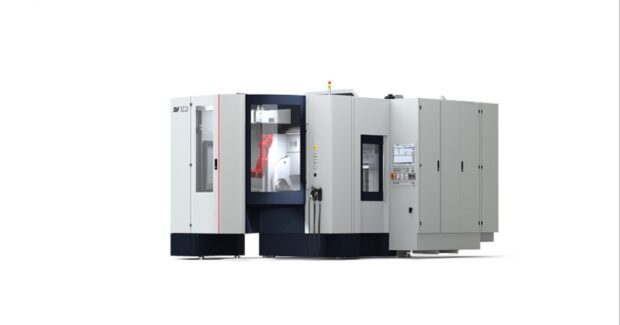In It for Life
Facing shorter product lifecycles, demands for faster production startups and the need for higher flexibility in machining, more shops are looking for “life partners” who plan and coordinate machine tool installations, deliver faster commissioning and startup, and provide extensive portfolios of remedies, repair and support for the entire service life of the system.
Posted: October 7, 2019
Volatility of demand has risen sharply in many industries, creating the need for shorter product lifecycles, faster production startup and new flexibility in machining operations – prompting more shops to look for suppliers who will become “life partners” that take on the responsibility of planning and coordination for the installation of new machining capacities under great time pressure and adapt quantities, then provide the highest availability over the entire lifecycle of the equipment by quickly resolving faults through service and support. In this environment, multi-spindle machining centers are an economical remedy because they multiply productivity over single-spindle machines in a comparable area with greater energy efficiency. In actual practice, however, the requirements for system automation often bottleneck delivery time, the commissioning of machinery and startup of production. To address this, life partners must establish comprehensive system competence in this area.
For example, we recently developed the BA 322i, a two-spindle independent manufacturing system with independent automation that significantly speeds up commissioning and startup. We shorten the time required to do this with completely automated, independent plug-and-play cells: The BA 322i combines a two-spindle machining center that is mechanically connected to an independent, automated loading module that uses an integrated six-axis robot and vertical pallet storage for raw and finished parts. This eliminates the typical electrical installation of assemblies in the user’s manufacturing hall, internal risk analysis for machine safety and separate commissioning of the automation.
NINE HOURS OF PRODUCTION WITH NO HUMAN INTERVENTION
Automated independent manufacturing cells like this are ideal for one operator being responsible for several machines or when production is fully automated in unsupervised shifts. The six-axis robot loads-unloads parallel to machining time and is positioned on the machine cover to ensure free access to the machine from all sides. This arrangement also opens up free spaces for other technologies, such as measuring or checking parts, reclamping, labeling or scanning. Vertical pallet storage integrated into the module can hold more than 1,100 raw or finished parts the size of automobile compressor wheels. This system can run unsupervised for over nine hours with a cycle time of one minute for every two parts. A mobile cage with low-wearing ball screw drive is used for pallet transport so that operators can ergonomically load-unload pallets.
COMPLETE MANUFACTURING LINES FROM A SINGLE SOURCE
Because planning for new production lines and factories has now reached such complexity that manufacturers are often unable to handle it internally, life partners can design, plan and implement complete turnkey production lines according to individual specifications, assuming overall responsibility for projects of this nature and coordinating all the tasks. Life partner application engineers use the latest plant simulation software for the entire factory or line in their planning to optimize cycle time design and minimize possible risks in advance with material flow analysis. Skillful planning reduces the number of loading and clamping processes while boosting productivity with automated value-added chains. These engineers also calculate workpiece costs in advance together with the user to ensure planning security.
Life partners take on the responsibility for machine and plant construction, together with all additional stations and all automation. This begins when raw parts are fed into the line. Starting from there, each station is automatically loaded-unloaded (for the most part) using robots. Where it makes sense, two, three and four-spindle machines ensure maximum throughput, while one-spindle machines are used for special machining tasks. The parts are then cleaned and cycled into other process steps. More users also specify the information technology connected to higher-level systems like this, so life partner software specialists work out suitable solutions, sometimes including the development of MES systems specially coordinated with the application. Recording the operating data down to the NC block level ensures that all production steps can be tracked for every component with strict quality assurance.
Certain life partners own assembly plants and engineering capacities in the U.S. and China for flexibility to respond to regional requirements for system business in these markets and offer a high level of local added value – criteria that is becoming increasingly important for projects in Asia and the Americas. This is also true for machines, independent cells or complete manufacturing lines: After commissioning, users expect the highest availability over the entire lifecycle and for faults to be remedied quickly. For example, we offer this with an extensive portfolio of “life” services for the entire service life of systems, including new data-based “life data” services that play a key role: The automated systems transfer operating data from the shop floor that is approved by the user to a CloudPlatform around the clock. Service specialists use analysis tools to convert this data into useful, practical information.
The data is used not only to optimize production processes, but also to detect wear before it leads to machine downtime. Currently, about 1,000 machines are already connected to the CloudPlatform, the majority of them replicated regularly. Service visits are planned in advance by using status reports that can be viewed at any time for notification when wear limits have been reached. “Life help” experts also analyze the machine online during a service visit. Many tasks that previously required a technician on-site can now be carried out together with the user from the technician’s workstation. If a service call is required for the machine, however, service technicians know in advance what the error is and which spare parts are needed – reducing downtime considerably. “Life” services also include commissioning and launch support for systems on-site, training for operators and maintenance engineers, and worldwide delivery of original parts. We also give installed machines a second and third life through hardware and software upgrades and complete overhauls.















